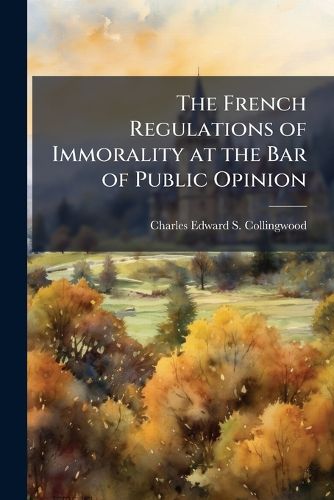Readings Newsletter
Become a Readings Member to make your shopping experience even easier.
Sign in or sign up for free!
You’re not far away from qualifying for FREE standard shipping within Australia
You’ve qualified for FREE standard shipping within Australia
The cart is loading…






This title is printed to order. This book may have been self-published. If so, we cannot guarantee the quality of the content. In the main most books will have gone through the editing process however some may not. We therefore suggest that you be aware of this before ordering this book. If in doubt check either the author or publisher’s details as we are unable to accept any returns unless they are faulty. Please contact us if you have any questions.
The French Regulations of Immorality at the Bar of Public Opinion, also known as The Bureau Des MA"urs Among the Breakers, delves into the intricate history of the regulation of prostitution in 19th-century France. Authored by Charles Edward S. Collingwood, this work examines the public discourse surrounding the 'Bureau des MA"urs, ' the agency responsible for policing morality.
Collingwood analyzes the social, legal, and ethical debates that arose as France grappled with issues of public health, social order, and individual liberty. This book provides valuable insights into the historical context of prostitution regulation and the complex interplay between law, morality, and public opinion. It remains relevant for scholars interested in the history of law, gender studies, and social control.
This work has been selected by scholars as being culturally important, and is part of the knowledge base of civilization as we know it. This work was reproduced from the original artifact, and remains as true to the original work as possible. Therefore, you will see the original copyright references, library stamps (as most of these works have been housed in our most important libraries around the world), and other notations in the work.
This work is in the public domain in the United States of America, and possibly other nations. Within the United States, you may freely copy and distribute this work, as no entity (individual or corporate) has a copyright on the body of the work.
As a reproduction of a historical artifact, this work may contain missing or blurred pages, poor pictures, errant marks, etc. Scholars believe, and we concur, that this work is important enough to be preserved, reproduced, and made generally available to the public. We appreciate your support of the preservation process, and thank you for being an important part of keeping this knowledge alive and relevant.
$9.00 standard shipping within Australia
FREE standard shipping within Australia for orders over $100.00
Express & International shipping calculated at checkout
Stock availability can be subject to change without notice. We recommend calling the shop or contacting our online team to check availability of low stock items. Please see our Shopping Online page for more details.
This title is printed to order. This book may have been self-published. If so, we cannot guarantee the quality of the content. In the main most books will have gone through the editing process however some may not. We therefore suggest that you be aware of this before ordering this book. If in doubt check either the author or publisher’s details as we are unable to accept any returns unless they are faulty. Please contact us if you have any questions.
The French Regulations of Immorality at the Bar of Public Opinion, also known as The Bureau Des MA"urs Among the Breakers, delves into the intricate history of the regulation of prostitution in 19th-century France. Authored by Charles Edward S. Collingwood, this work examines the public discourse surrounding the 'Bureau des MA"urs, ' the agency responsible for policing morality.
Collingwood analyzes the social, legal, and ethical debates that arose as France grappled with issues of public health, social order, and individual liberty. This book provides valuable insights into the historical context of prostitution regulation and the complex interplay between law, morality, and public opinion. It remains relevant for scholars interested in the history of law, gender studies, and social control.
This work has been selected by scholars as being culturally important, and is part of the knowledge base of civilization as we know it. This work was reproduced from the original artifact, and remains as true to the original work as possible. Therefore, you will see the original copyright references, library stamps (as most of these works have been housed in our most important libraries around the world), and other notations in the work.
This work is in the public domain in the United States of America, and possibly other nations. Within the United States, you may freely copy and distribute this work, as no entity (individual or corporate) has a copyright on the body of the work.
As a reproduction of a historical artifact, this work may contain missing or blurred pages, poor pictures, errant marks, etc. Scholars believe, and we concur, that this work is important enough to be preserved, reproduced, and made generally available to the public. We appreciate your support of the preservation process, and thank you for being an important part of keeping this knowledge alive and relevant.